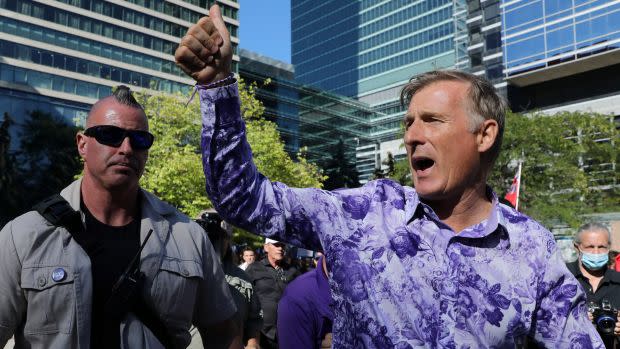Canada’s far-right fringe is getting stronger
- Oops!Something went wrong.Please try again later.

Justin Trudeau remains Canada’s prime minister today, having successfully won a Sept. 20 snap election that could have cost him his political career.
By calling for the vote six weeks earlier, Trudeau, leader of the Liberal party, put himself at risk of losing his job to Erin O’Toole, head of the Conservative Party of Canada. Instead, he will return to Ottawa with enough seats to rule a second minority government, likely leaning on the leftist New Democratic Party, which took 24 seats, to push through parts of his progressive agenda.
O’Toole’s missteps in the campaign—his party won 119 seats while the Liberals have so far claimed 158 ridings, with 99% of votes counted—are now being thoroughly dissected by political analysts. One factor that led to his loss appears to be the rise of the People’s Party of Canada, a populist group that is anti-immigration, anti-establishment, anti-vaccine mandates, and anti-science, which may have split the Conservative vote.
PPC leader Maxime Bernier met his main goal
Whereas O’Toole aimed to be a mostly moderate candidate, the PPC attracted racist far-right voters, anti-maskers, and aspiring politicians like one Nicolas Periera, who believes men should not ejaculate, as Vice reported.
Such PPC characters make the party an easy target for derision. Its members didn’t manage to win a single vote in the election—not even for PPC leader Maxime Bernier, a former cabinet minister from Quebec who left the Conservative party when it was more right of center than today, but still not radical enough for him.
However, the PPC can’t and shouldn’t be written off, either. Bernier—famous for calling climate activist Greta Thunberg “mentally unstable”—appears to be playing the long game. He doesn’t seem picky about which extreme causes fall under his self-titled “freedom umbrella,” if they will get him back into government.
Bernier has claimed that his main goal in the election was to boost the party’s share of the vote and that he wasn’t concerned about seats. By that measure, he has succeeded. The party tripled its share of votes from 1.5% in the 2019 election to around 5% in this latest one, according to CBC News. Bernier did that by tapping into anti-lockdown sentiment during the pandemic and by taking a strong stand against Trudeau’s pledged vaccine mandates both for federal workers and people traveling on planes and trains in Canada.
Hatred, intolerance, and ignorance—in Canada?
Over the past several years, Canada has been rocked by events forcing the country to reflect on its history and current politics. The reality doesn’t always square with Canada’s international reputation as a haven of multicultural harmony and progressive ideals.
For example, although Trudeau has settled 44,000 Syrian refugees since taking office, and has pledged to welcome 40,000 Afghan refugees, Canada also has witnessed increased domestic anti-Muslim terrorism. This summer, four members of a Pakistani-Canadian family out for an evening walk in London, Ontario, were mowed down by a 19-year-old driver, leaving only a nine-year-old boy alive to mourn his parents, sister, and grandmother. Sadly, that apparent hate crime was not an isolated event.
Anti-vax protests and conspiracy theories have challenged governments around the world—and Canada has been no exception. If anything, recent protests outside hospitals that have forced vulnerable sick people and worn-out healthcare workers to walk by members of an unmasked mob to reach hospital doors are among the vilest displays against science, social responsibility, and basic humanity seen anywhere.
Most shockingly to many Canadians was the discovery over the past year of unmarked graves of hundreds of people, including children, on the properties of five former residential schools. The state-funded schools run by various religious institutions forcibly removed indigenous children from their homes through much of the 20th century. Children who lived in the schools were prohibited from speaking their native languages or practicing cultural traditions, and many endured years of sexual, physical, and psychological abuse. So far, more than 1,300 bodies have been identified.
A warning to Canada, and everyone else
Whereas Canada’s mainstream parties focused, to a limited degree, on the economic and political rights of indigenous peoples and other marginalized groups during the election, the PPC promised to repeal the official Multiculturalism Act and focus on “the integration of immigrants,” while limiting immigration numbers. And Bernier denied that the discovery of thousands of graves proved Canada’s involvement in an attempted cultural genocide.
He may not be going to Ottawa, but Benier has advanced the PPC ahead of the Green party in terms of pure votes and that should serve as a warning within Canada and beyond its borders.
Sign up for the Quartz Daily Brief, our free daily newsletter with the world’s most important and interesting news.
More stories from Quartz:
